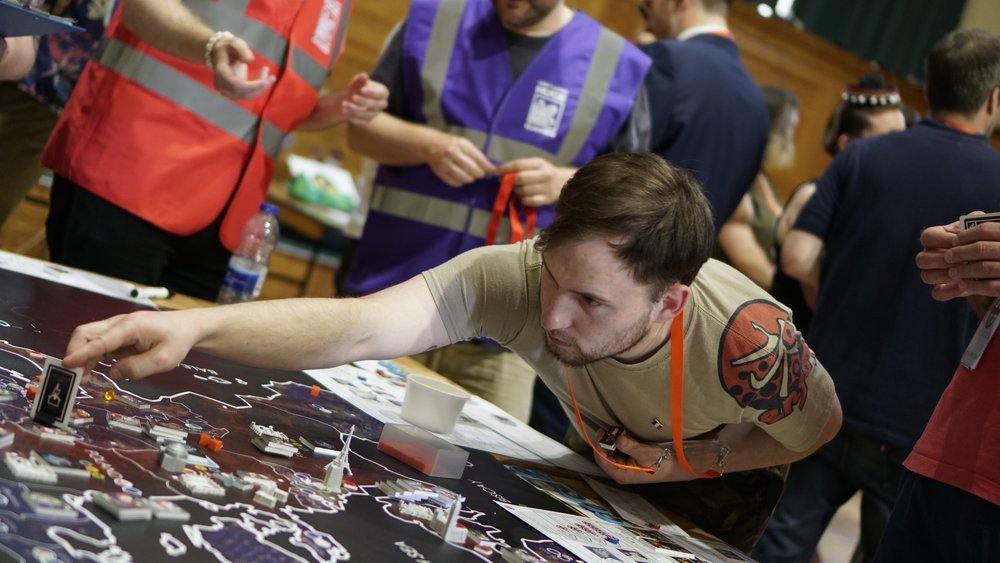Why LARPs are better than megagames
A player from Pickles’ megagame, Copper, Cockroaches & Cows. Credit: Paul Howarth
Jonathan Pickles, better known in the community as Pickles, has designed a number of megagames including Copper, Cockroaches & Cows about the Mexican civil war and The Real Heroes - are they actually superheroes or just vigilantes making everything worse?
Here Pickles gives us his potentially controversial opinion on why LARPs are better than megagames…
That’s a bold title but I couldn’t restate it without a lot of qualifiers! It is obviously expressing my opinion, not even my opinion, my preference, as an objective truth.
The executive summary is that LARPs tend to emphasise roleplaying and characterisation where megagames fall back on minigames. As I enjoy roleplaying more than light games, I enjoy LARPs more (because roleplaying IS better than playing a light game).
Not that long ago, John Keyworth bemoaned that all new megagames are all just reskins of Watch the Skies, and I do love a good generalisation. I take this to mean that games feature a bunch of symmetrical teams, each of which is made up of players with tightly allotted roles. During a turn those players go off and carry out tasks related to that role and these tasks are called “minigames” in the current vernacular. Typically, there will be a committee game and a map game. There are also often some sort of economic game and science game. The minigames may be strongly representative simulations of the purported task or may be highly abstract or dissociated.
I suspect that this comes from a “top down” sort of megagame design. A megagame looks like “this” so we want to fill those slots in our game, then it’s a matter of finding minigames to keep the players in those slots occupied.
I’d bet that is not how Jim designed Watch the Skies in the first place. It would come from an approach of figuring out the important elements to include in the game then trying to get the best way to represent them and the interactions between them. If science will not plausibly have an impact during the course of the game, then maybe do not include it. If you are modelling say a pandemic then science will be key to solving the central problem, and would probably benefit from a robust immersive game system not a few RP suggestions.
My personal distaste for the minigames is twofold. The first is that they are of necessity rather simplistic. They have to be picked up and resolved quickly by players who may not have grokked the rules - my rule of thumb for boardgames is that I play them wrong at least once. In a minigame I sometimes feel like I am playing a light game for 6 long hours, when it would otherwise struggle to engage me for 40 minutes.
A player enjoying the map at First Contact: 2035. Credit: Very Large Huge Games
Something else related to this is that the games are often figured out after a few turns of frantic learning. At this point they do not really fill out the allotted time, time that may have been needed when everyone was new to them. This is the most personal part of all this; some people like light games, even Carcassonne.
Of course, the pure mechanical element is not the whole of it. The minigames should be given context by how they fit into the wider structure and ideally would involve interacting with other players as a baseline way of doing that.
The second personal issue is the opportunity cost of playing a mechanical game I could play at any time. Instead, I want to take advantage of the unique opportunities provided by a megagame to interact with a huge number of players in interesting ways, or even in fairly banal ways. I thoroughly enjoyed collecting status items in Mirrorshades by swapping with all & sundry. The key was that I had a reason to talk to anyone, the mechanism was neither here nor there (simplest was best). Other people I know do like the opportunity to be a panzer division commander and drive on Moscow even if they only talk to 4 other people all day. That, in its full context, is another opportunity only provided in a megagame.
A table of goodies to swap and sell to other players at Mirrorshades. Credit: Jim Wallman
In a LARP you would typically play a well-defined character with a backstory, links to several other characters, and objectives which may be far more personal than in a megagame like finding your real parents, always getting the last word in over your rival, or getting revenge over the man who ruined your piano recital and stopped you getting the girl, etc.
I have never seen a LARP where people are cast as a role as opposed to a character, probably for this reason. In the course of the game, you talk to a lot of people in character so have to enjoy a bit of characterisation and acting to get the full benefit of it (or in my case sometimes watching other great roleplayers do this). A game would be shorter typically but more intense without the longueurs during resolution of flaccid mechanisms.
Why not do this in megagames? The best reason is that the designer wants to represent what they feel is a key element of the situation they are covering. They need a subsystem to draw resources from, and to provide inputs into the rest of the game. The next reason is familiarity - megagames have minigames QED. Finally, mechanisms are easy. It is far easier to write (or borrow) a largely functional game to keep 8 people occupied than it is to write 8 briefings rich enough for the same purpose.
UK megagames are also locked into the “spend all day playing then go to the pub'' format. This was helpful when a game took that long of necessity or to make it more worthwhile to travel for a game. It’s not really relevant for online games or games played at conventions where the players are already committed to the event and are on site. Minigames can feel like filler to make the game last the full day. A more intense 4-hour game without them might hit the spot better.
So here is my wish list for megagames in the future:
They work out what they are trying to do then the best structure for it rather than having forms that seems to come first
They incorporate richer briefings and only introduce “minigames” where these are needed to drive a key game function and they are integrated in the rest of the game
When there has to be a minigame it is designed as fun as possible for the players involved rather than something too abstract or too dry such that it feels like busy work
Games are built to be the right length, not stretched over a whole day if there is not really enough there
What do you think? Do you agree with what Pickles has said here or perhaps he’s dead wrong? Let us know on our Facebook group!
Got a megagame blog post lurking in the darkest reaches of your mind? Let us know and it could appear on the site!



